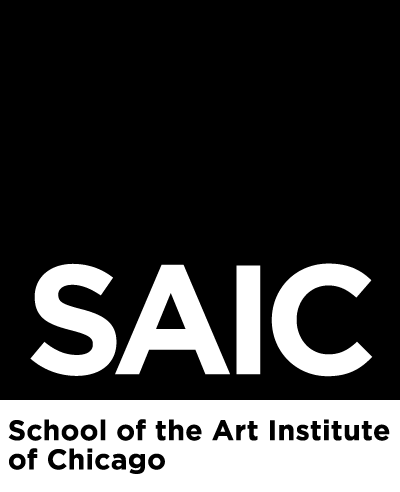Shu Lea Cheang’s Fresh Kill
Posted by | gfung | Posted on | April 11, 2024
Thursday, April 11, 6:00 p.m
Join Shu Lea Cheang for a screening of her acclaimed cyberfeminist eco-thriller FRESH KILL, newly restored for its 30th anniversary.
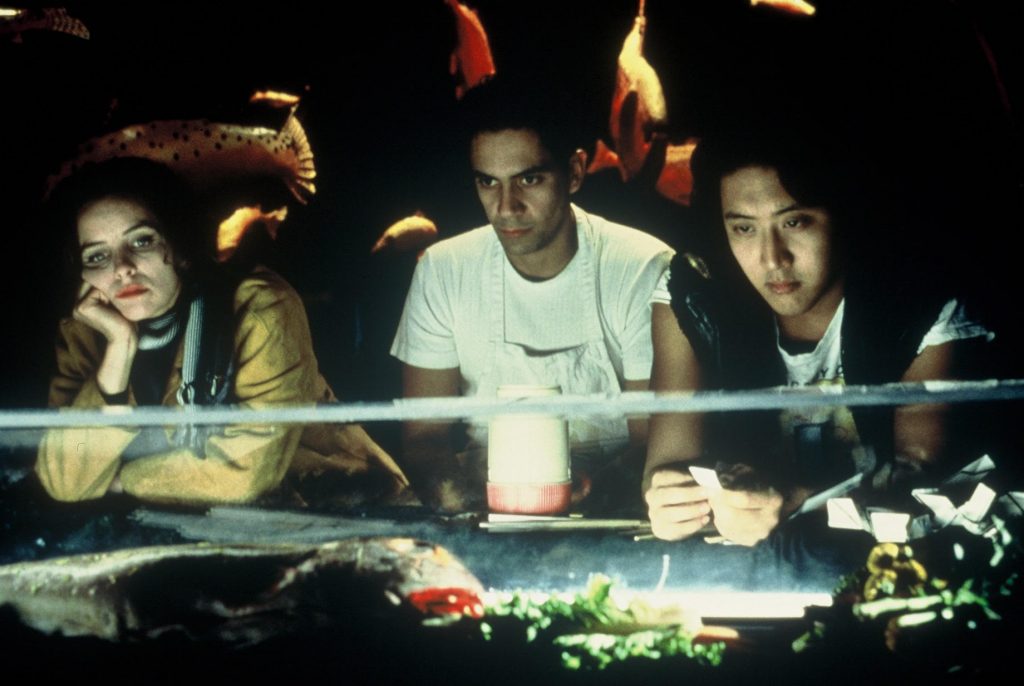
Shu Lea Cheang, Fresh Kill, 1994. Courtesy of the artist.
“Shu Lea Cheang’s audacious directorial debut is a lethal comedy swimming through a torrent of toxic multinational treachery.” —Lawrence Chua, BOMB Magazine
Renowned media artist Shu Lea Cheang presents her groundbreaking debut feature, a cyberfeminist eco-thriller, newly restored for its 30th anniversary. Partners Shareen (Sarita Choudhury) and Claire (Erin McMurtry) find themselves in the crosshairs of a nefarious multinational corporation after they discover it is poisoning citizens through toxic cat food, contaminated sushi, and nuclear waste. When their daughter disappears, they turn to a global band of hackers and activists. Cheang shifts between horror, camp, and agit-prop, structuring the film around an electric sense of destabilization and disruption. Characteristic of the activist impulse that runs through all her work, Fresh Kill’s themes of predatory capitalism and environmental catastrophe remain just as pressing today.
1994, Shu Lea Cheang, USA, 80 min.
In English / Format: 35mm
Presented in partnership with Video Data Bank.
About the artist
Born in Taiwan and now based in Paris, Shu Lea Cheang is an artist and filmmaker whose work aims to re-envision genders, genres, and operating structures. She began her career as a member of activist media collectives Paper Tiger TV and Deep Dish TV. Later, as a celebrated pioneer of Net Art, her work Brandon (1998–99) became the first-ever web-based artwork commissioned and collected by the Solomon R. Guggenheim Museum. Since 1994, she has produced four feature films, Fresh Kill (1994), I.K.U. (2000), Fluidø (2017), and UKI (2023), which encompass a new genre she calls “Scifi New Queer Cinema.” In 2019, she represented Taiwan at the Venice Biennale with the mixed media installation, 3x3x6. Over the years, Cheang has participated in many renowned international biennials, including Performa 19, New York; the 11th Taipei Biennial; the 50th and 58th Venice Biennale; and the 1992 and 1994 Whitney Biennials among others. Her works are included in the world’s key permanent collections for contemporary art, including the Museum of Modern Art, New York; Whitney Museum of American Art, New York; Solomon R. Guggenheim Museum, New York; NTT InterCommunication Center, Tokyo; Walker Art Center, Minneapolis; and DSL collection, Paris.
Accessibility
CATE events are presented with real-time captions (CART). Hearing loops, wheelchair accessibility, and companion seating are also available at the @filmcenter. For other accessibility requests, please visit saic.edu/access or write cate@saic.edu.
Shu Lea Cheang’s UKI
Posted by | gfung | Posted on | April 10, 2024
Wednesday, April 10, 6:00 p.m.
Join artist and filmmaker Shu Lea Cheang for the Chicago premiere of UKI (2023), an exhilaratingly queer science-fiction epic of corporate surveillance, contagion, sex, and biotechnology.
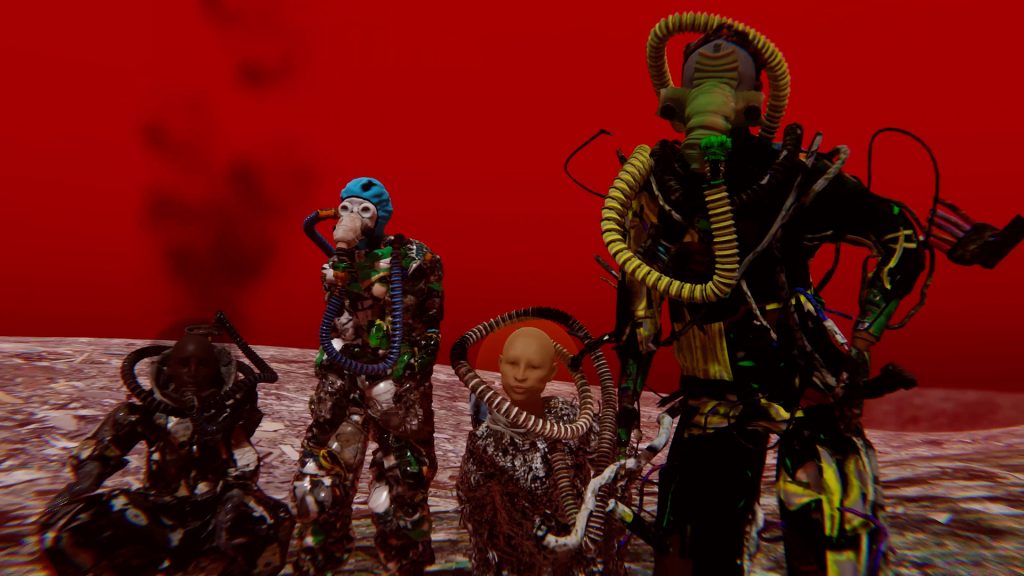
Shu Lea Cheang, UKI, 2023. Courtesy of the artist.
In her latest feature, pioneering media artist Shu Lea Cheang mixes 3D animation and live action to create an exhilaratingly queer science-fiction epic of corporate surveillance, contagion, sex, and biotechnology. Residents of a city beset by a viral epidemic discover that the pharmaceutical firm GENOM has been harvesting data about their sex lives to develop a drug that will bring the population under its control. Meanwhile, one of GENOM’s humanoid data collectors, dumped into a toxic e-waste site, mutates into the virus UKI. Backed by mutants, castoffs, and the city’s infected activists, UKI sets out to sabotage the firm’s authoritarian ambitions. Drawing from her experiences with the COVID-19 pandemic and the AIDS crisis of the 1980s and ‘90s, Cheang imbues UKI with the power, in her words, “to mobilize, to infiltrate, to subvert.”
2023, Shu Lea Cheang, Germany / USA, 86 min.
In English / Format: Digital
Presented in partnership with Video Data Bank.
About the artist
Born in Taiwan and now based in Paris, Shu Lea Cheang is an artist and filmmaker whose work aims to re-envision genders, genres, and operating structures. She began her career as a member of activist media collectives Paper Tiger TV and Deep Dish TV. Later, as a celebrated pioneer of Net Art, her work Brandon (1998–99) became the first-ever web-based artwork commissioned and collected by the Solomon R. Guggenheim Museum. Since 1994, she has produced four feature films, Fresh Kill (1994), I.K.U. (2000), Fluidø (2017), and UKI (2023), which encompass a new genre she calls “Scifi New Queer Cinema.” In 2019, she represented Taiwan at the Venice Biennale with the mixed media installation, 3x3x6. Over the years, Cheang has participated in many renowned international biennials, including Performa 19, New York; the 11th Taipei Biennial; the 50th and 58th Venice Biennale; and the 1992 and 1994 Whitney Biennials among others. Her works are included in the world’s key permanent collections for contemporary art, including the Museum of Modern Art, New York; Whitney Museum of American Art, New York; Solomon R. Guggenheim Museum, New York; NTT InterCommunication Center, Tokyo; Walker Art Center, Minneapolis; and DSL collection, Paris.
Accessibility
CATE events are presented with real-time captions (CART). Hearing loops, wheelchair accessibility, and companion seating are also available at the @filmcenter. For other accessibility requests, please visit saic.edu/access or write cate@saic.edu.
Lizzie Borden’s Working Girls
Posted by | gfung | Posted on | March 29, 2024
Friday, March 29, 6:00 p.m.
Join the iconic filmmaker Lizzie Borden for a screening of Working Girls.
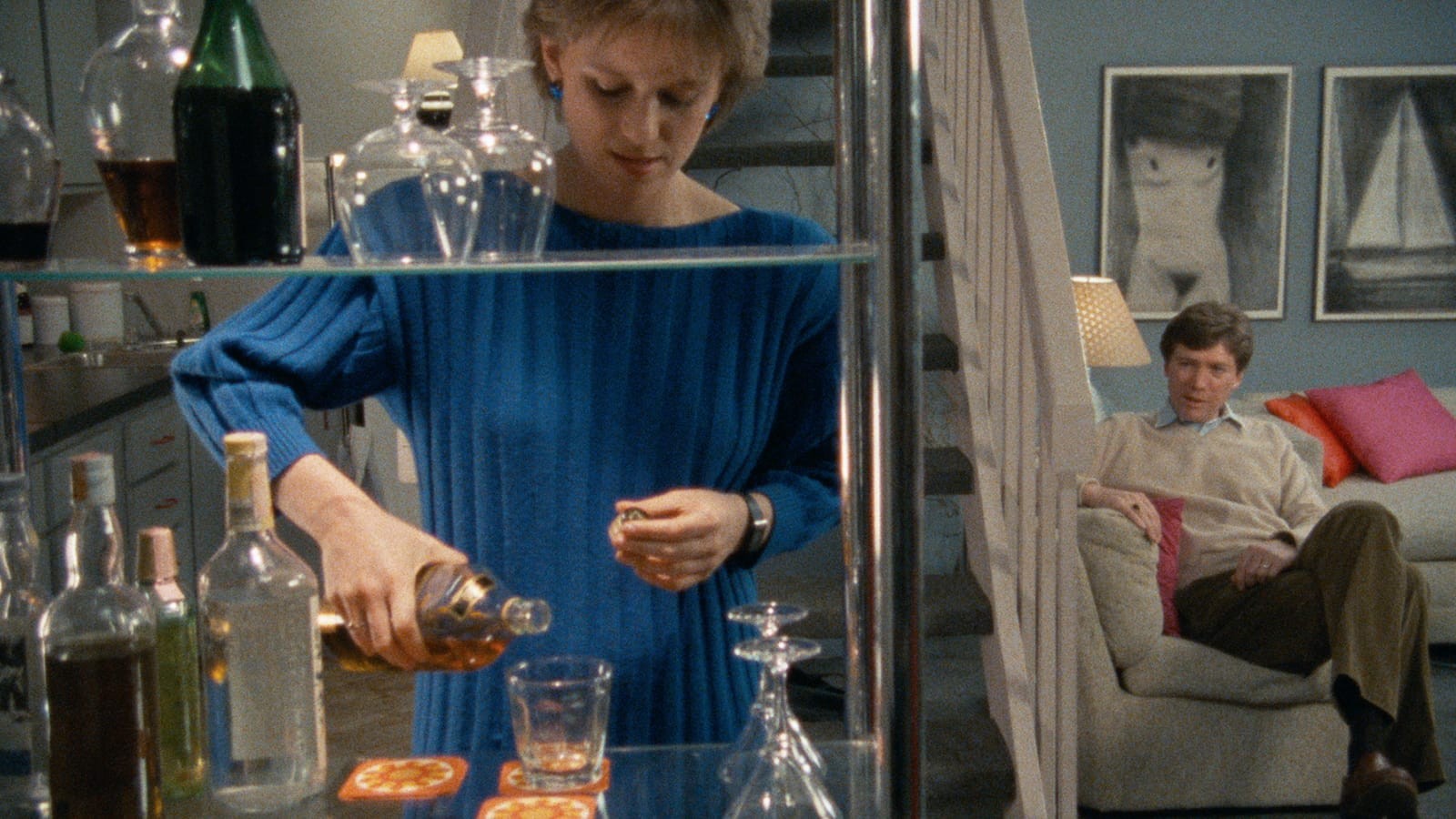
Lizzie Borden, Working Girls, 1986. Courtesy of Janus Films.
“Working Girls is, among its serious splendors, an act of solidarity.” —So Mayer, Current
In her groundbreaking third feature, Lizzie Borden looks at gender, race, and labor relations in a Manhattan brothel. Inspired by the experiences of sex workers Borden met while making Born in Flames, Working Girls follows the rhythms of a day-in-the life of Molly (Louise Smith), an artist who turns to sex work to fund her photography practice (images provided by the artist Nan Goldin). Molly and her colleagues greet clients in the brothel’s pastel-hued reception, change sheets, answer the phone, and log their earnings in a ledger overseen by their overpaid boss, paralleling women’s labor of all kinds—from domestic to the office.
Lizzie Borden, 1986, USA, 93 minutes
In English / Format: DCP
Digitally restored by The Criterion Collection and the UCLA Film & Television Archive, in conjunction with Sundance Institute. Funding provided by The Criterion Collection and Sundance Institute. Laboratory services by Criterion Post and Roundabout Entertainment, Inc.
Presented in partnership with the Gene Siskel Film Center; the University of Illinois Chicago’s (UIC) College of Architecture, Design, and the Arts; and UIC’s Department of Gender and Women’s Studies.
About the artist
Lizzie Borden is a writer, director, editor, and script consultant. Her 1983 film Born in Flames, named one of “The 50 Most Important Independent Films” by Filmmaker Magazine, has been shown at countless festivals and theaters around the world. It has been taught and written about extensively since its 1983 premiere at the Berlin Film Festival. In 2016, when the film was restored by Anthology Film Archives, New Yorker critic Richard Brody called it “a feminist masterpiece.” Borden also wrote, directed, and produced the controversial independent fiction film Working Girls, which premiered at the Cannes Film Festival in the Directors’ Fortnight, won a US Dramatic Special Jury Recognition at the Sundance Film Festival, and was restored by the Criterion Collection in 2021. Borden’s long-unseen 1976 film Regrouping was restored by Anthology Film Archives in 2023.
Accessibility
CATE events are presented with real-time captions (CART). Hearing loops, wheelchair accessibility, and companion seating are also available at the @filmcenter. For other accessibility requests, please visit saic.edu/access or write cate@saic.edu.
Tags: Anthology Film Archives > Born in Flames > Gene Siskel Film Center > Lizzie Borden > Regroup > University of Illinois Chicago > Working Girls
Lizzie Borden’s Born in Flames
Posted by | gfung | Posted on | March 28, 2024
Thursday, March 28, 8:30 p.m.
Join the iconic filmmaker Lizzie Borden for a screening of BORN IN FLAMES.
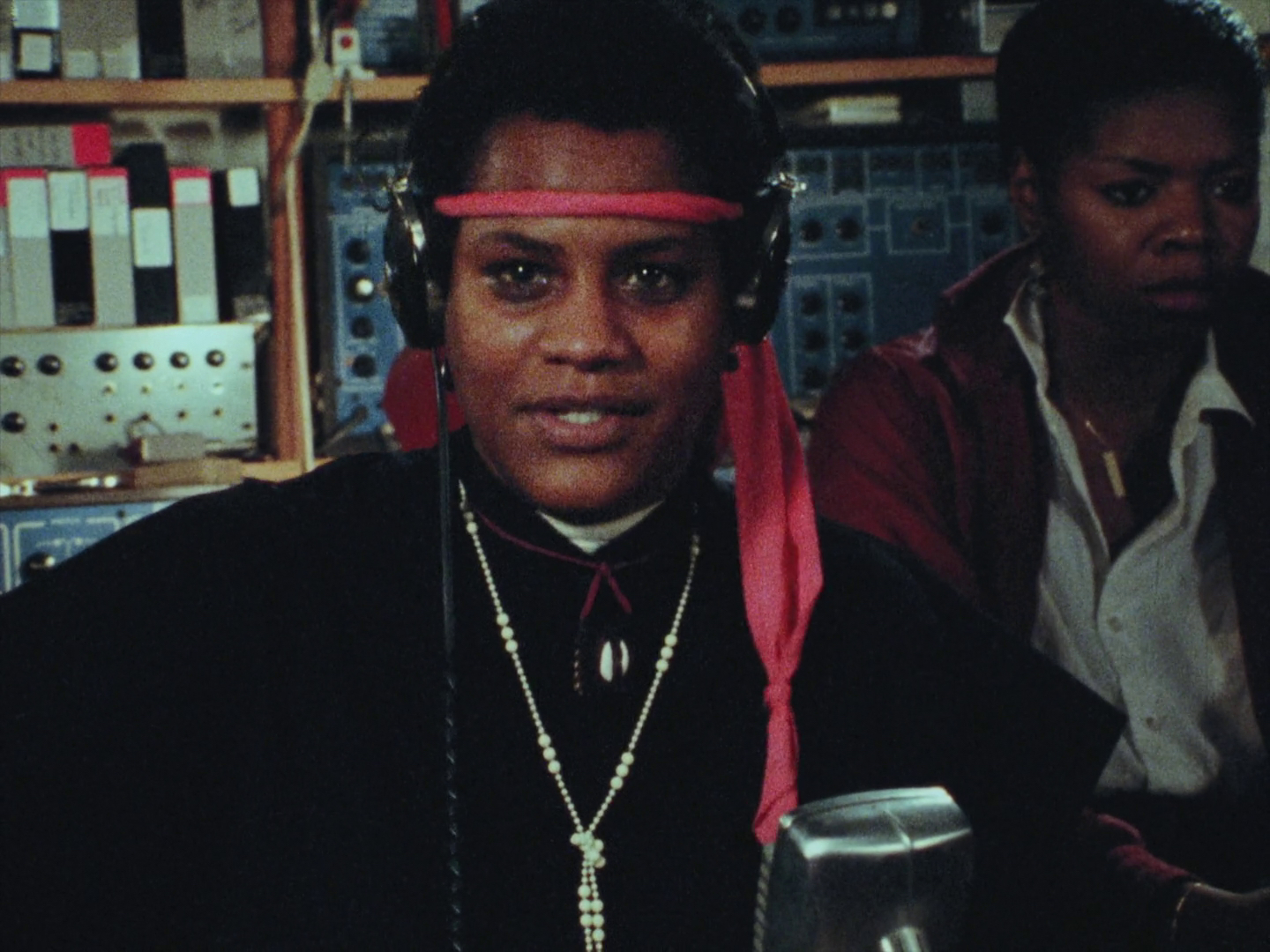
Lizzie Borden, Born in Flames, 1983. Courtesy of Janus Films and Anthology Film Archives.
“By turns humorous, satirical, and deadly earnest … a still-potent artifact of political commitment.” —LA Weekly
“Deserves its legendary status and still has the power to challenge.” —Eric Monder, Film Journal International
Lizzie Borden’s legendary second feature is a thrillingly provocative tale of female rebellion set in America 10 years after a social democratic cultural revolution. When Adelaide Norris (Jean Satterfield), the Black radical founder of the Woman’s Army, is mysteriously killed, a diverse group of women—Black, white, queer, hetero, working class, and elite—build a coalition to topple the patriarchy once and for all. Radical in both style and politics, Borden’s film brings together documentary footage, incendiary news reports, and violent action sequences to underscore the urgency of intersectional feminism in the face of oppression. Fueled by a post-punk soundtrack and featuring performances by numerous cultural luminaries including civil rights activist Florynce Kennedy, Honey, Adele Bertei, and Kathryn Bigelow, among many others, Born in Flames continues to resonate today.
Lizzie Borden, 1983, USA, 80 minutes
In English / Format: 35mm
Preserved by Anthology Film Archives with restoration funding from the Hollywood Foreign Press Association and The Film Foundation.
Presented in partnership with the Gene Siskel Film Center; the University of Illinois Chicago’s (UIC) College of Architecture, Design, and the Arts; and UIC’s Department of Gender and Women’s Studies.
About the artist
Lizzie Borden is a writer, director, editor, and script consultant. Her 1983 film Born in Flames, named one of “The 50 Most Important Independent Films” by Filmmaker Magazine, has been shown at countless festivals and theaters around the world. It has been taught and written about extensively since its 1983 premiere at the Berlin Film Festival. In 2016, when the film was restored by Anthology Film Archives, New Yorker critic Richard Brody called it “a feminist masterpiece.” Borden also wrote, directed, and produced the controversial independent fiction film Working Girls, which premiered at the Cannes Film Festival in the Directors’ Fortnight, won a US Dramatic Special Jury Recognition at the Sundance Film Festival, and was restored by the Criterion Collection in 2021. Borden’s long-unseen 1976 film Regrouping was restored by Anthology Film Archives in 2023.
Accessibility
CATE events are presented with real-time captions (CART). Hearing loops, wheelchair accessibility, and companion seating are also available at the @filmcenter. For other accessibility requests, please visit saic.edu/access or write cate@saic.edu.
Tags: Anthology Film Archives > Born in Flames > Gene Siskel Film Center > Lizzie Borden > Regroup > University of Illinois Chicago > Working Girls
Lizzie Borden’s Regroup
Posted by | gfung | Posted on | March 28, 2024
Thursday, March 28, 6:00 p.m.
Join the iconic filmmaker Lizzie Borden for a screening of REGROUPING.
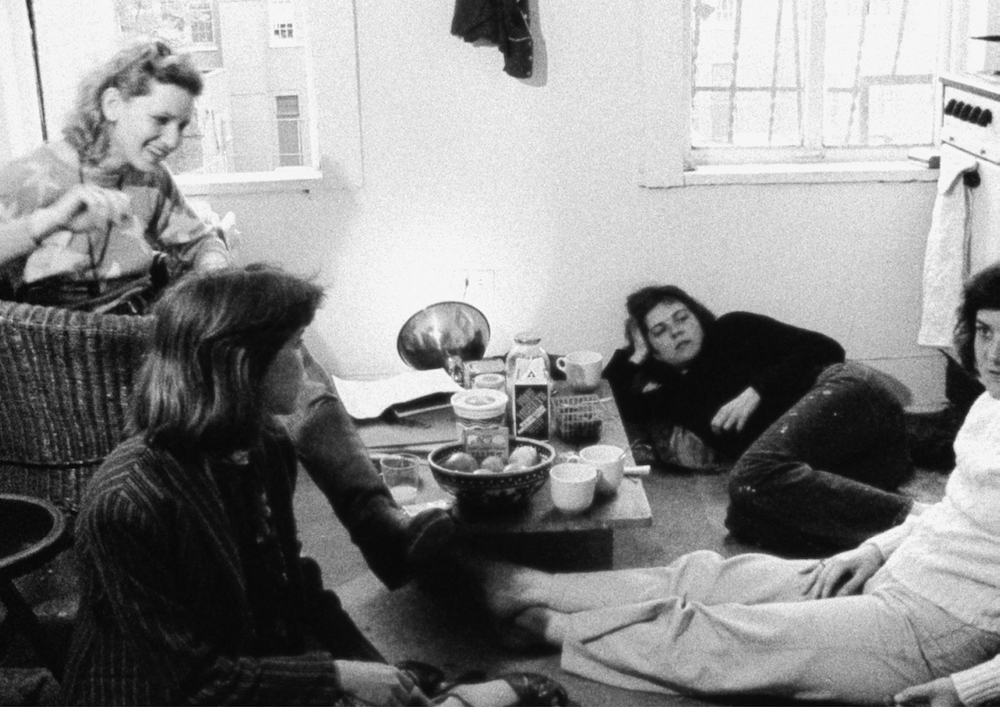
Lizzie Borden, Regrouping, 1976. Courtesy of Janus Films and Anthology Film Archives.
“Combative, entropic, mesmerizing.” —Melissa Anderson, 4Columns
Lizzie Borden’s daring first feature is a shapeshifting portrait of a women’s collective and the slippery relationship between a filmmaker and her subjects. When the collective breaks down, the film similarly fragments, with the introduction of fictional characters, disjunctive sounds and images, and multi-textual observations by artists outside the group, including Joan Jonas, Barbara Kruger, Nancy Holt, and Kathryn Bigelow, resulting in a rich and complicated depiction of 1970s feminism. The collective protested Borden’s final cut after Regrouping’s 1976 premiere and Borden shelved the film for many years. Now, with the participants’ permission, it is circulating once more in a restoration by Anthology Film Archives.
Lizzie Borden, 1976, USA, 80 minutes
In English / Format: 16mm
Restored by Anthology Film Archives and The Film Foundation with funding provided by the Hobson/Lucas Family Foundation
Presented in partnership with the Gene Siskel Film Center; the University of Illinois Chicago’s (UIC) College of Architecture, Design, and the Arts; and UIC’s Department of Gender and Women’s Studies.
About the artist
Lizzie Borden is a writer, director, editor, and script consultant. Her 1983 film Born in Flames, named one of “The 50 Most Important Independent Films” by Filmmaker Magazine, has been shown at countless festivals and theaters around the world. It has been taught and written about extensively since its 1983 premiere at the Berlin Film Festival. In 2016, when the film was restored by Anthology Film Archives, New Yorker critic Richard Brody called it “a feminist masterpiece.” Borden also wrote, directed, and produced the controversial independent fiction film Working Girls, which premiered at the Cannes Film Festival in the Directors’ Fortnight, won a US Dramatic Special Jury Recognition at the Sundance Film Festival, and was restored by the Criterion Collection in 2021. Borden’s long-unseen 1976 film Regrouping was restored by Anthology Film Archives in 2023.
Accessibility
CATE events are presented with real-time captions (CART). Hearing loops, wheelchair accessibility, and companion seating are also available at the @filmcenter. For other accessibility requests, please visit saic.edu/access or write cate@saic.edu.
Tags: Anthology Film Archives > Born in Flames > Gene Siskel Film Center > Lizzie Borden > Regroup > University of Illinois Chicago > Working Girls
Elisabeth Subrin: Maria Schneider, 1983 and Shulie
Posted by | gfung | Posted on | March 21, 2024
Thursday, March 21, 6:00 p.m.
Join Elisabeth Surbin for a program of her stunning short films!
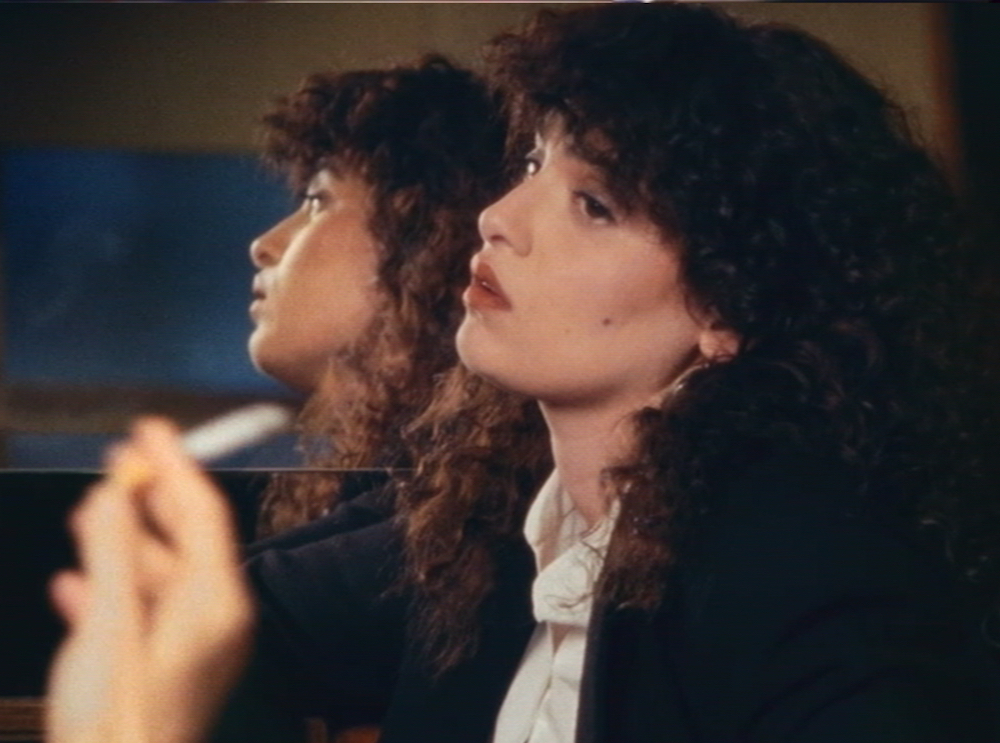
Elisabeth Subrin, Maria Schneider, 1983, 2022. Courtesy of the artist and Manifest Pictures.
In her acclaimed “speculative biographies,” filmmaker and SAIC alum Elisabeth Subrin (MFA 1995) explores the absences and erasures of women’s lives in the historic record. She presents two works, produced 26 years apart, that use reenactment to express the ways we continue to live with, in Subrin’s words, “the residues of the past.”
Presented in partnership with Video Data Bank.
Program
Maria Schneider, 1983
2022, 25 minutes
Best Documentary Short Film, 2023 César Awards
“Subrin has made a provocative, unnerving document, difficult to forget.” —Tony Pipolo, Artforum
In Elisabeth Subrin’s latest film, actresses Manal Issa, Aïssa Maïga, and Isabel Sandoval recreate a 1983 French television interview with the iconic Maria Schneider. When asked about Shneider’s traumatic experience filming Last Tango in Paris with Bernardo Bertolucci and Marlon Brando, the actresses not only perform Schneider’s words and gestures, but inhabit them through their own identities. Together, they conjure all who have been silenced, before and after. (Adapted from the New York Film Festival.)
Shulie
1997, 37 minutes
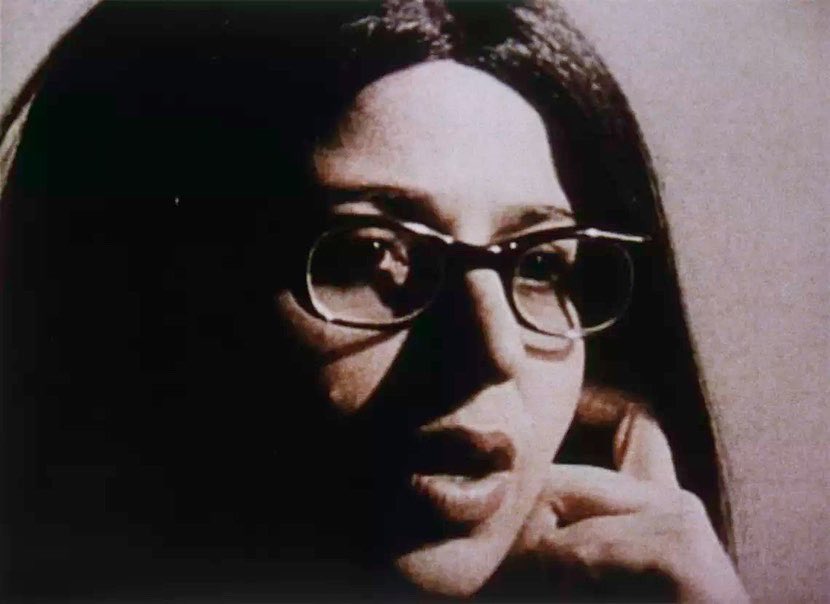
Elisabeth Subrin, Shulie, 1997. Courtesy of the artist and Video Data Bank.
“Shulie is… daring and revelatory… Subrin’s ideas are beautiful, and the movie is a thing of wonder.” —Richard Brody, The New Yorker
“A cinematic doppelganger without precedent.” —Mark MacElhatten, New York Film Festival
Subrin’s landmark film Shulie (1997) is a shot-by-shot reenactment of an unreleased 1967 documentary portrait of Shulamith Firestone, then a student at the School of the Art Institute of Chicago, who, just a few years later, would go on to write her influential radical feminist treatise The Dialectic of Sex: The Case for Feminist Revolution. Through the film’s meticulous staging and performances, Subrin reflects on the ways Firestone’s experiences of gender, race, and class continue to echo today.
1997–2022, USA / France, 62 minutes
In English and French with English subtitles / Format: DCP
Presented in partnership with Video Data Bank.
About the artist
Elisabeth Subrin is a New York–based award-winning director and artist. Her critically acclaimed films and video installations have been featured in numerous festivals and exhibitions internationally, including solo shows at the Museum of Modern Art, New York; Film at Lincoln Center, New York; and the 2020 Viennale, Vienna. Subrin’s 2016 award-winning feature narrative, A Woman, a Part, premiered in competition at the International Rotterdam Film Festival and traveled to festivals throughout Europe, the United States, and Asia. It was released theatrically in 2017. Subrin’s The Listening Takes, her 2023 multi-channel video, sound, and sculptural installation, will open May 26, 2024 at Participant, INC in New York. Subrin is currently developing a feature-length biopic about Maria Schneider.
Accessibility
CATE events are presented with real-time captions (CART). Hearing loops, wheelchair accessibility, and companion seating are also available at the @filmcenter. For other accessibility requests, please visit saic.edu/access or write cate@saic.edu.
Tags: César Awards > Documentary > Elisabeth Subrin > Maria Schneider > Shulie > Video Data Bank
An Evening with Baloji
Posted by | gfung | Posted on | February 29, 2024
Thursday, February 29, 6:00 p.m.
Join critically acclaimed Belgian-Congolese artist and musician Baloji for a screening of his stunning short films.
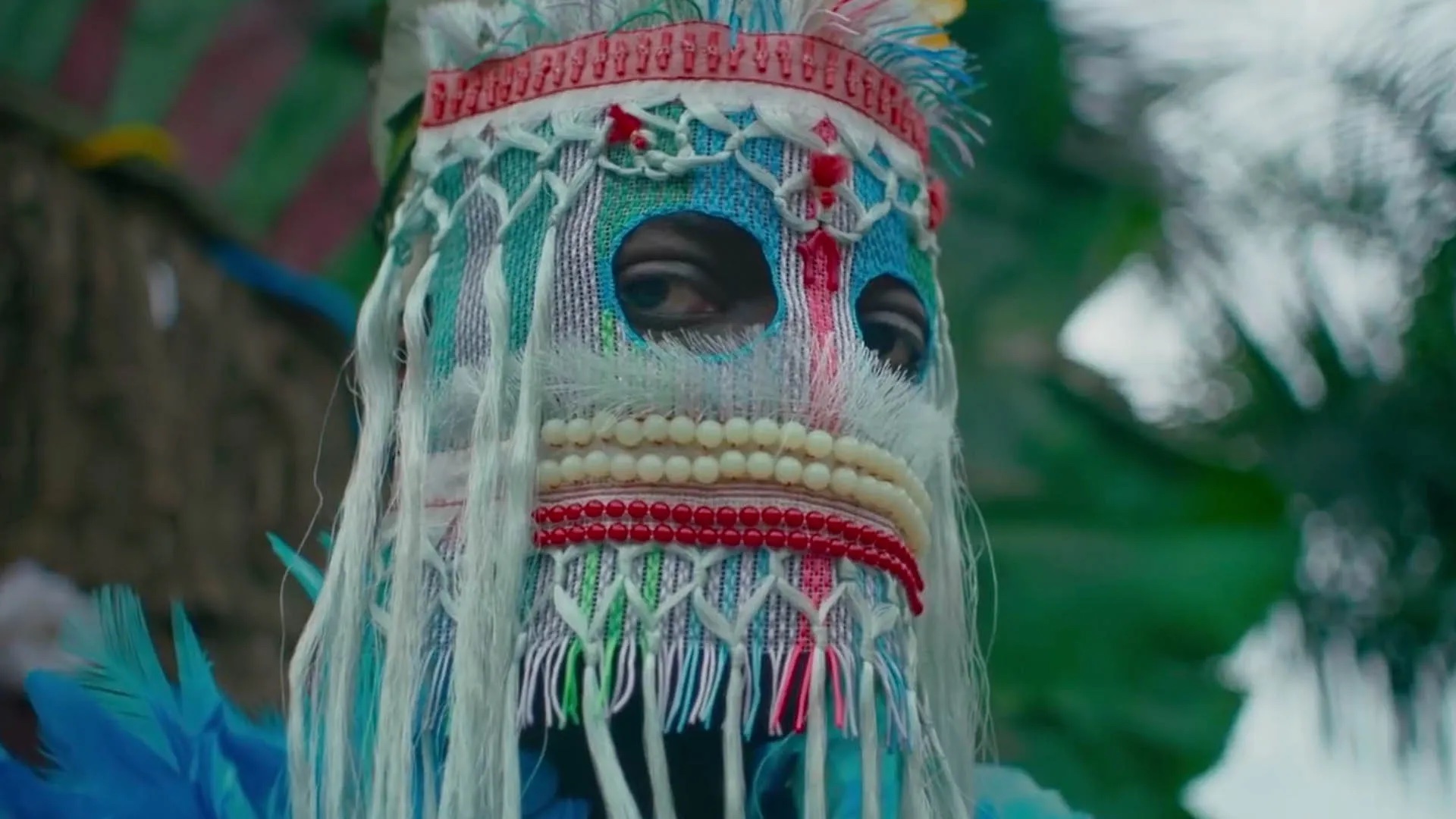
Baloji, Peau de Chagrin / Bleu de Nuit, 2018. Courtesy of the artist and Sudu Connexion.
Critically acclaimed Belgian-Congolese artist and musician Baloji presents a selection of his stunning short films. Operating in the realms between documentary, magical realism, and social critique, Baloji’s hybrid practice explores the transcultural identities of African diasporans and the history and future of the Congo. He often collaborates with other artists to create elaborate costumes and sets his films to his own music, itself a kaleidoscope of hip-hop, Congolese rumba, and house with lyrics that mix the personal and political.
2018–19, Belgium / Democratic Republic of the Congo, 54 minutes
In French with English subtitles / Format: DCP
Presented in partnership with the Gene Siskel Film Center, which premieres Baloji’s debut feature Omen on Friday, March 1, as part of the European Union Film Festival: Spotlight on Belgium.
Program
Kaniama Show
2018, 23 minutes
Winner, Special Jury Prize, Festival International du Film Francophone de Namur
Echoing the title of his critically acclaimed 2018 album 137 Avenue Kaniama, Baloji’s short is a stinging satire of political corruption and media collusion in post-independence Democratic Republic of the Congo. Taking shape as a Sunday afternoon variety show, smiling guests sing the praises of government officials and mining interests while musical interludes suggest a different reality.
Peau de Chagrin / Bleu de Nuit
2018, 10 minutes
“A dreamscape of electric hues and intriguing characters”– Daphne Milner, It’s Nice That
In the bewitching Peau de Chagrin / Bleu de Nuit, Baloji meditates on both the ardent bonds between people as well as between people and the land. Set on a former Univlier plantation in Lusanga now cultivated by the Congolese Plantation Workers Art League—an art and agricultural cooperative that has bought the territory back with profits from the sale of artworks to Western institutions—the film unfolds in a series of tableaux that interweave the story of an unstable romance with the violent history of colonial extraction. Suffused with the region’s greenery, the two stories play out on stages woven from palm leaves and Indigenous vegetation and overseen by skeleton-faced ghosts.
Never Look at the Sun
2019, 5 minutes
When he was young, Baloji often heard the expression “never look at the sun…because you’re already black enough.” In this collaboration with the acclaimed writer and designer Thandi Loewenson, he uses choreography, costume, and poetry to examine the effects of colorism and skin lightening on the psyches of Black men and women.
Zombies
2019, 15 minutes
Winner, Principal Prize Oberhausen International Short Film Festival
Set in a hallucinatory Kinshasa, Zombies explores the effects of social media and its myopic soft power. Moving through the city’s hair salons, futuristic clubs, street parades, and a river overflowing with garbage, Baloji’s subjects pose for the camera or keep their eyes on their phones. Collaborating with queer performers and street artists in striking costumes made from trash like bottle caps and e-waste, Baloji also amplifies Kinshasans’ spirit of reinvention and disruption in their efforts to redress long-entangled social, political, and environmental injustices. These men and women, he suggests, are the creative resistance to our digital “servitude volontaire.”
About the artist
Born in Lubumbashi, Democratic Republic of the Congo, and based in Belgium, Baloji is an award-winning musician, filmmaker, art director, and costume designer. The word “baloji” refers to occult and evil forces. In Swahili, it initially meant “man of science,” but in colonial times it has been interpreted as “man of occult sciences”—essentially, “sorcerer.” This nominal assignment has proved to be both a burden and a gift, driving his visionary interest in the oneiric, magical, and historical. As a filmmaker, Baloji has produced six shorts, including the award-winning Zombies and the feature Omen, which won the Prix de la nouvelle voix at the 2023 Cannes Film Festival and is Belgium’s entry for the 2023 Academy Awards. Baloji Augurism, a solo exhibition related to Omen, is currently on view at the Fashion Museum Antwerp. As a musician, Baloji has released two solo EPs and two critically acclaimed albums, HotelL Impala (2007, EMI France) and 137 Avenue Kaniama (2018, Bella Union).
Accessibility
CATE events are presented with real-time captions (CART). Hearing loops, wheelchair accessibility, and companion seating are also available at the @filmcenter. For other accessibility requests, please visit saic.edu/access or write cate@saic.edu.
Tags: Baloji > Democratic Republic of the Congo > European Union Film Festival > Festival International du Film Francophone de Namur > Omen
The Blue Description Project
Posted by | gfung | Posted on | February 15, 2024
Thursday, February 15, 6:00 p.m.
Artists Liza Sylvestre and Christopher Jones present their elastic, experimental, and expansive THE BLUE DESCRIPTION PROJECT.
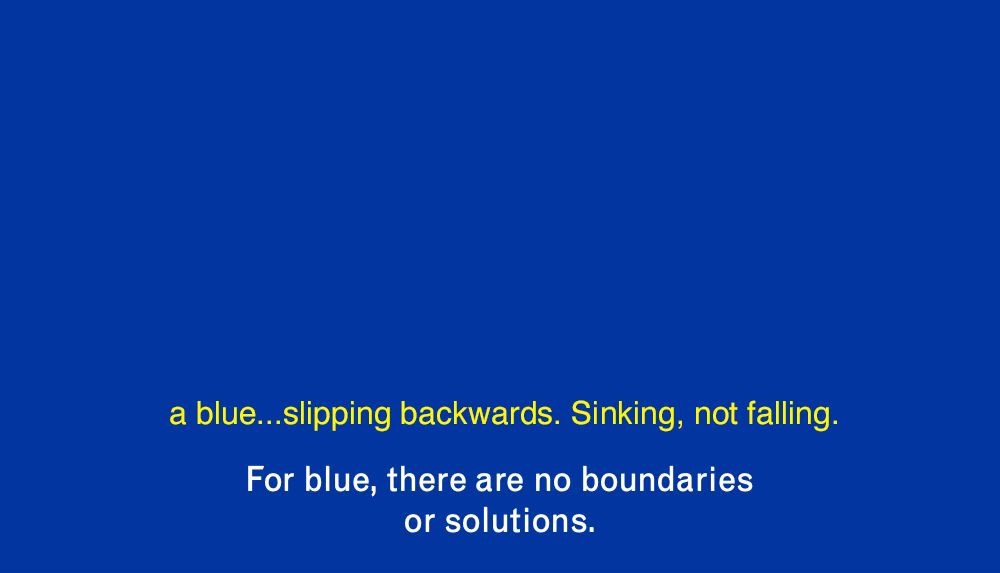
Derek Jarman, Blue, 1993. Presented with new open captions and a captioned audio description track produced by The Blue Description Project, 2024.
In 1993, the British artist Derek Jarman released Blue, an epoch-defining account of AIDS, illness, and the experience of disability in a culture of repressive heteronormativity and compulsory able-bodiedness. Despite being referred to as a feature film, Blue never existed exclusively in one medium. It was screened in theaters, simulcast on television and radio, released as a CD, and published as a book, creating opportunities for many different kinds of sensory abilities—visual, aural, and textual—to experience the work. The Blue Description Project, conceived by artists and writers Liza Sylvestre and Christopher Jones, builds on the multifaceted nature of Jarman’s work through newly commissioned and expansive accessibility. Reflecting Blue’s standing as a foundational work of Crip art, the project challenges ableist hierarchies in art while focusing on the generative possibilities of difference and interdependence.
Sylvestre, Jones, and scholar Sarah Hayden will join us virtually for an extended conversation about the project after the screening.
The Blue Description Project is produced by Crip*—Cripistemology and the Arts, a transdisciplinary initiative in the College of Fine and Applied Arts at the University of Illinois Urbana-Champaign in partnership with Sarah Hayden and the Voices in the Gallery research initiative at the University of Southampton.
Liza Sylvestre and Christopher Jones, 2024, United States, 82 minutes
In English with open captions and captioned audio descriptions / Format: DCP
Presented in partnership with SAIC’s Department of Art Therapy and Counseling and Disability Culture Activism Lab (DCAL) and Bodies of Work: Network of Disability Art and Culture, a multi-institutional program comprised of DCAL; Access Living’s Art and Culture Project; the University of Illinois–Chicago’s Department of Disability and Human Development and Disability Cultural Center; and the Shirley Ryan AbilityLab.
AbilityLab receives funding from the National Institute on Disability, Independent Living, and Rehabilitation Research (NIDILRR), part of the US Department of Health and Human Services’ (HHS) Administration for Community Living (ACL). The contents of this program may not represent the policies of NIDILRR, ACL, or HHS, or the endorsement of the federal government. This program is partially supported by a grant from the Illinois Arts Council Agency.
About the artists
Liza Sylvestre is a multimedia artist and research assistant professor within the College of Fine and Applied Arts at the University of Illinois Urbana-Champaign where she has co-founded the initiative Crip*—Cripistemology and the Arts. Her work has been shown internationally, including the Plains Art Museum (Fargo), Weisman Art Museum (Minneapolis), John Hansard Gallery (Southampton), ARGOS (Brussels), and Museum für Moderne Kunst (Frankfurt). Sylvestre has been the recipient of both an Artists Initiative and Arts Learning grant from the Minnesota State Arts Board, a fellowship through Art(ists) on the Verge, a VSA Jerome Emerging Artist Grant, an Art Works grant from the National Endowment for the Arts, a Kate Neal Kinley Memorial Fellowship, and a fellowship from the Joan Mitchell Foundation. She has been artist-in-residence at the Weisman Art Museum and the Center for Applied and Translational Sensory Science. In 2019, she received a Citizens Advocate Award from the Minnesota Commission of the Deaf, DeafBlind, and Hard of Hearing. Sylvestre’s work has been written about in numerous publications and books including Art in America, Mousse Magazine, Ocula Magazine, Art Monthly, and SciArt Magazine.
Christopher Robert Jones is an artist and writer based in Illinois. Their research revolves around the “failure” or “malfunctioning” of the body and how those experiences are situated at points of intersection between Queer and Crip discourses. They are a regular contributor to Art Papers magazine and their work has recently been exhibited at the Krannert Art Museum, Gallery 400, and the Weisman Art Museum. Jones is the co-founder of Crip*—Cripistemology and the Arts, a transdisciplinary initiative that is housed within the College of Fine and Applied Arts at the University of Illinois Urbana-Champaign, where they are also a research assistant professor.
Sarah Hayden is a writer and Associate Professor in Literature and Visual Culture at the University of Southampton. From 2019–2023, she led “Voices in the Gallery,” a research, writing and curatorial project on intersections of voice, text and access in contemporary art funded by the UK’s Arts and Humanities Research Council. In 2022, she developed slow emergency siren, ongoing: Accessing Handsworth Songs in partnership with LUX and co-led the “Art of Captioning” British Art Network Research Group with Hannah Wallis. Recent writings include essays on Charlie Prodger for The Association of Visual Artists Vienna Secession, Sharon Hayes for Bricks from the Kiln, and captioning as “unvoiceover” for Angelaki: Journal of the Theoretical Humanities.
Accessibility
CATE events are presented with real-time captions (CART). Hearing loops, wheelchair accessibility, and companion seating are also available at the @filmcenter. For other accessibility requests, please visit saic.edu/access or write cate@saic.edu.
Tags: AbilityLab > Christopher Jones > Derek Jarman > Liza Sylvestre > Sarah Hayden > Video Data Bank
Beatriz Santiago Muñoz: ORIANA and GOSILA
Posted by | Amy Beste | Posted on | October 26, 2023
Thursday, October 26, 6:00 p.m.
Join San Juan–based artist Beatriz Santiago Muñoz for the Chicago premiere of her new feature ORIANA.

“The videos of Beatriz Santiago Muñoz exhibit a sensibility deeply informed by long and careful looking at the tropical landscape of her native Puerto Rico.”–Erica Dawn Lyle, Art In America
“Less a speculative vision about what might be and more a provocation of how other futures are actualized in the present.” – Walker Art Center
Program
ORIANA
2023, Puerto Rico, 78 minutes
In Spanish with English subtitles, Format: DCP
Beatriz Santiago Muñoz’s (MFA 1997) films explore the physical and symbolic stories of the Caribbean. In ORIANA, a band of feminist warriors takes refuge in a verdant Puerto Rican landscape. Set in the wake of Hurricane Maria and featuring performances by a group of San Juan–based artists and activists, the film takes inspiration from French writer and theorist Monique Wittig’s radical 1969 novel Les Guérillères. As Muñoz’s characters move through forests, abandoned industrial sites, and colonial ruins, ORIANA visualizes the possibilities for creating a decolonial and feminist world.
GOSILA
2018, Puerto Rico, 10 minutes
In Spanish with English subtitles, Format: DCP
A film about disorder, sense-making from the ground up, slowness, and the work in the days after a hurricane.
About the artist
Beatriz Santiago Muñoz lives and works in San Juan, Puerto Rico. Her expanded moving-image practice brings together Boalian theater, experimental ethnography, and feminist thought to focus on the sensorial unconscious of anti-colonial movements and everyday poetic work in the Caribbean. Her artworks have been featured in numerous solo and group exhibitions internationally, including solo shows at Argos Centre for Audiovisual Art, Brussels; Pivô, São Paulo; CRAC Alsace, Altkirch, France; Espacio Odeón, Bogotá; Pérez Art Museum Miami; and the New Museum, New York. She received a master of fine arts from the School of the Art Institute of Chicago in 1997.
Accessibility
This event will have real-time captions (CART). For other accessibility requests, please visit saic.edu/access or contact cate@saic.edu.
Tags: Beatriz Santiago Muñoz > Experimental > Les Guérillères > Monique Wittig > Puerto Rico
Lawrence Andrews: mythicPotentialities
Posted by | Amy Beste | Posted on | October 12, 2023
Thursday, October 12, 6:00 p.m.
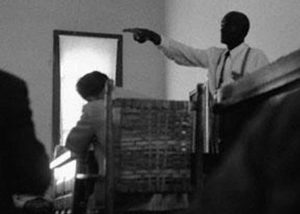
Enthralling in form and vision, Lawrence Andrews’ works are kaleidoscopic explorations of Blackness through mass media and popular culture.
In the genre-defying imageless video mythicPotentialities (2019), Andrews examines the murder of Emmett Till, the trial that followed, and the ways these events have been mediated through artistic and mass media. Focusing on Till’s great uncle Moses Wright, who testified at the trial, Andrews asks what happens when we imagine Wright’s life beyond the limited events that came to define him.
2019, Lawrence Andrews, USA, 60 mins
In English, Format: Digital
Presented in partnership with SAIC’s Video Data Bank.
About the artist
Lawrence Andrews’s practice spans video, photography, and installation. Employing multi-layered strategies of appropriation, he often focuses on media and culture, suggesting that “culture is all we are as people; we speak about it, look at ourselves through it, and ultimately change because of it.” Andrews’s work has shown extensively throughout the US and internationally on television, at major film festivals, and in museums and galleries, including the Whitney Museum of American Art, New York; the Museum of Modern Art, New York; the San Francisco Museum of Modern Art; the Berkeley Art Museum and Pacific Film Archive; and the American Film Institute, Los Angeles; among others. He has received numerous grants and fellowships, including a Rockefeller Intercultural Documentary Fellowship and two National Endowment for the Arts Artist Fellowships.
Accessibility
This event will have real-time captions (CART). For other accessibility requests, please visit saic.edu/access or contact cate@saic.edu.
Tags: Black Noise > Emmett Till > Experimental Essay > Lawrence Andrews > Moses Wright > sound art > Video Data Bank
